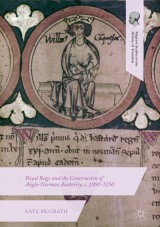Details

Royal Rage and the Construction of Anglo-Norman Authority, c. 1000-1250
Palgrave Studies in the History of Emotions
|
85,59 € |
|
| Verlag: | Palgrave Macmillan |
| Format: | |
| Veröffentl.: | 18.02.2019 |
| ISBN/EAN: | 9783030112233 |
| Sprache: | englisch |
Dieses eBook enthält ein Wasserzeichen.
Beschreibungen
<p>This book explores how eleventh- and twelfth-century Anglo-Norman ecclesiastical authors attributed anger to kings in the exercise of their duties, and how such attributions related to larger expansions of royal authority. It argues that ecclesiastical writers used their works to legitimize certain displays of royal anger, often resulting in violence, while at the same time deploying a shared emotional language that also allowed them to condemn other types of displays. These texts are particularly concerned about displays of anger in regard to suppressing revolt, ensuring justice, protecting honor, and respecting the status of kingship. In all of these areas, the role of ecclesiastical and lay counsel forms an important limit on the growth and expansion of royal prerogatives.</p>
<p>Chapter 1: Introduction.- Chapter 2: The Ecclesiastical Culture of Anger.- Chapter 3: Righteous Royal Rage.- Chapter 4: Shameful Royal Rage.- Chapter 5: Role of Counsel in Directing Royal Rage.- 6. Chapter 6: Epilogue.</p>
<b>Kate McGrath</b> is Associate Professor of History at Central Connecticut State University, USA.
<p>This book explores how eleventh- and twelfth-century Anglo-Norman ecclesiastical authors attributed anger to kings in the exercise of their duties, and how such attributions related to larger expansions of royal authority. It argues that ecclesiastical writers used their works to legitimize certain displays of royal anger, often resulting in violence, while at the same time deploying a shared emotional language that also allowed them to condemn other types of displays. These texts are particularly concerned about displays of anger in regard to suppressing revolt, ensuring justice, protecting honor, and respecting the status of kingship. In all of these areas, the role of ecclesiastical and lay counsel forms an important limit on the growth and expansion of royal prerogatives.</p>
Offers the first in-depth evaluation of the representation of royal anger in eleventh- and twelfth-century historical narratives Analyzes the development of norms for royal anger and how Anglo-Norman and later English kings used anger as a political strategy Explores how ecclesiastical historians both assisted and circumscribed the expansion of royal authority
Diese Produkte könnten Sie auch interessieren:

Deportationen aus der Westukraine von 1947-1952 und die ukrainische Nationalbewegung

von: Julia Ramchen

18,99 €
















